Projects of the Class of 2021–2022
Resource Guides and Community Building for LGBTQIA+ Graduate Students


Chloe Brotherton and Gwyneth Manser
(Ph.D. Candidate, Linguistics) & (Ph.D. Candidate, Geography)
LGBTQIA graduate students face unique challenges relative to their cisgender and heterosexual peers. LGBTQIA graduate students may have a more difficult time than their peers in accessing and affording basic needs, accessing safe and affirming mental and physical healthcare, navigating academic relationships, and building community. In a 2020 University of California survey, 14% of UC Davis graduate students who responded identified as LGBTQIA. Despite this, there are not many resources on the UC Davis campus available specifically for LGBTQIA graduate students.
Due to a lack of centralized information and resources for LGBTQIA graduate students, we saw a need to develop a series of resource guides specifically catering towards LGBTQIA graduate students at UC Davis. The goal of these resource guides was to develop easy-to-read guides that LGBTQIA students can use to find support, build community, and navigate graduate student life at UC Davis. These resource guides will be shared on the LGBTQIA Resource Center’s website and will include links and descriptions of resources, programs and community groups on-campus and in the local area. The guides were designed to be able to be shared and modified in the future as more resources are developed. We also created a Slack Channel for LGBTQIA graduate students to use for community-building and resource sharing.
Click here to view their final poster
Improving Science Communication through Improv Theater
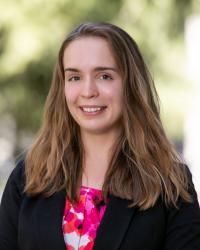
Rachael Coon
(Ph.D. Candidate, Animal Biology)
The pandemic has forced nearly all communication onto virtual platforms, limiting opportunities for connection and discussion of research between graduate students and potential audiences. It is important that in the wake of Covid-19 and the trend towards isolating ourselves socially from both peers and strangers, graduate students practice communicating their research to broad audiences. This workshop brought graduate students together from all disciplines to learn about using performative theater techniques to engage an audience with storytelling techniques. Practicing improv theater improves stage presence, mental acuity, and audience awareness, all skills necessary for successful communication. Participants had the opportunity to develop their research pitch into a relatable message and hear from graduate students who have mastered the skill of research communication in the UC Davis Grad Slam competition.
Thirty-nine graduate students and post-docs from 18 different graduate programs participated in 1 of 2 workshops offered in either February or May 2022. The workshop format was developed after consultation with Dr. Laura Lindenfeld, the Executive Director of the Alan Alda Center for Communicating Science, Mr. David Dannenfelser, a faculty member in the theater department at Rutgers University, and Dr. Maja Makagon, an associate professor in the department of Animal Science at UCD. These 90-minute workshops involved an introduction to improv theater and how its principles of active listening, audience engagement, and storytelling are important skills for researchers. The participants then had an opportunity to practice these skills in improv activities created to build on each other. The games were designed to maximize participants’ comfort through small group sizes since the performative aspects of improv can be intimidating, especially for those with no theater experience. Working in groups of two or three, participants learned about the importance of avoiding jargon and relating to a broad audience through the use of metaphor and analogy. There were also opportunities to speak directly to a partner about your research topic, and to receive feedback based on the lessons explored during the workshop. To conclude the event, I invited the winners of the 2021 and 2022 UCD Grad Slam competitions to speak about their experiences crafting a coherent and appealing research message, followed by a Q&A period. The objectives of the Grad Slam competition align with those of my PFTF project by encouraging graduate students to practice research communication in a concise, relatable, and engaging manner, which is why it was highlighted in the workshop. Sixty-eight percent of surveyed participants had never been involved in any improv-related activities and 100% felt that the workshop provided an opportunity to practice their research communication skills. The workshop was also effective in promoting the UCD Grad Slam competition, as 82% responded that they were more likely to compete after hearing from the workshop speakers. The willingness of participants to be vulnerable and interact with strangers in a new way created a positive learning environment for novel research communication strategies.
Click here to view the final poster
Education and Empowerment for Scholars Against Sexual Harassment in Academia
Rose De Kock
(Ph.D. Candidate, Neuroscience)
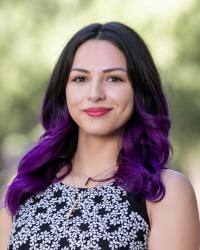
In 2018, the National Academy of Sciences, Engineering, and Medicine released a report describing the pervasiveness of the sexual harassment problem in academic STEM. The data demonstrate that sexual and gender harassment can severely and negatively impact survivors and their careers, is more common than typically acknowledged (e.g., affecting ~60% of women in STEM), and undermines the integrity of academic scholarship at a systemic level. Additionally, this burden is more likely to affect historically marginalized groups. These realities highlight the need for training resources to equip survivors, at-risk groups, and allies with tools for self-advocacy and empowerment.
To meet this goal, my Professors for the Future project was a virtual workshop series focused on trainee empowerment. The first session, Understanding Current trends and Institutional Climates, focused on current sexual harassment definitions, prevalence in academia, a discussion of how experiences can vary by identity (especially by marginalized groups), and institutional factors that can improve or worsen outcomes. The second session, Survivor Rights and Action Plans was facilitated by CARE representative Rachel Henry and focused on the rights that a survivor is entitled to, regardless of intent to report and covered where to seek help, protections that can be put in place for survivors, resources at UC Davis and within the community. The third, and final session, Mental Health Impacts and Strategies for Healing, was facilitated by mental health counselors Shannon Stuart-Maver and Maia Huang and covered the various ways that these experiences can lead to negative mental health outcomes, and how to advocate for oneself, how to advocate for others experiencing harassment, and strategies for self-care. In addition to the facilitators mentioned above, I received a great deal of help from my community, including my mentors at GradPathways, Colleen Sweeney from the Health-Equity Diversity and Inclusion committee, Eric Sanchez from the DEI office, Heather Spaulding from Environmental Health and Safety, and many others. I am excited to have participated in this effort to promote awareness and advocacy to the graduate community, and look forward to continuing similar work in the future.
Click here to view the final poster
LaTeX 101: Making Publication-Quality Papers and Professional-Grade Presentations
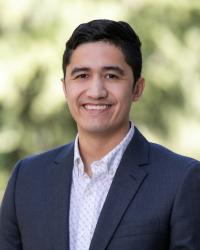
Mason del Rosario
(Ph.D. Candidate, Electrical and Computer Engineering)
LaTeX is an open-source typesetting system used to generate scientific and academic documents with high typographical quality. Many publication-quality STEM documents, including journal articles, textbooks, and presentations, are written in LaTeX. For graduate students, LaTeX is part of the hidden curriculum -- it is rarely taught formally, and learning to use it can be a frustrating and isolating experience.
My workshop series, "LaTeX 101: Making Publication-quality Papers and Professional-grade Presentations," was an introduction for novices to learn LaTeX with live help from experienced users. The first two sessions covered the curriculum of learnlatex.org, which covers the basics of typesetting, mathematical notation, and much more. The third session introduced attendees to common LaTeX templates, including CVs and presentations. After this workshop series, attendees should be able to use LaTeX to generate visually impressive documents for their own coursework, publications, and presentations.
The workshop was held on Zoom over the course of three days. Each day consisted of 1 hour of interactive lecture and 1 hour of working on a LaTeX exercise. Participants received help from myself (workshop organizer, lecturer) or Carlos (volunteer, teaching assistant). Students used Overleaf to edit and compile LaTeX files. Workshop materials, including recordings, slides, and exercises, are available at the following site.
Click here to view the final poster
Developing a Survey to Assess the Impact of COVID-19 on UC Davis Graduate Students

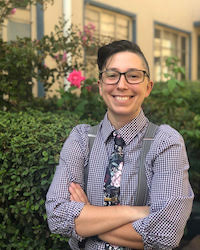
Aisha Faruqi and M.A. Miller
(Ph.D. Candidate, Civil and Environmental Engineering) & (Ph.D. Candidate, English)
Updated project description coming soon.
Click here to view the final poster
Now Hiring: Resources and Support for STEM PhDs Seeking Competitive Academic Positions

Alyssa Griffin
(Postdoctoral Scholar, Earth and Planetary Sciences)
According to the National Science Foundation, less than 20% of PhD recipients in Science, Technology, Engineering, and Mathematics (STEM) fields will obtain academic faculty positions. These statistics are drastically lower for women and minoritized scholars. The job market for coveted tenure-track faculty positions in STEM is notoriously competitive and is likely to become even more challenging in the post-pandemic landscape. While PhD recipients have demonstrated indisputable mastery of their discipline, many are left ill-equipped to navigate the academic job market. The “hidden curriculum” is often discussed at other educational and career stages, but is often overlooked when graduates are attempting to transition to faculty positions.
Trainees are typically expected to rely on the willingness, availability, and knowledge of either their graduate or postdoctoral mentor(s) for career advice. However, many mentors may be unavailable or unwilling to assist their trainees in this process. This sole reliance on mentors may be particularly problematic for minoritized scholars because there is evidence that mentors are less likely to engage with and can exhibit conscious and unconscious biases towards minoritized trainees. By equipping trainees with the information and tools they need to confidently navigate the STEM academic job market, institutions have an opportunity to make the job search more equitable, fill existing knowledge gaps, and make trainees from all backgrounds more competitive for highly sought-after tenure-track faculty positions in STEM.
My project augmented existing support at UC Davis for STEM graduate and postdoctoral trainees navigating the academic job market. I generated a written commentary feed for the UC Davis Internship and Career Center’s “Academic Job Applications Workshop” (see poster for commentary and link to video) based on my personal experience on the academic job market over the past year. Additionally, I provided key pieces of advice based on these experiences. My hope is that my personal journey on the academic job market will shed light on the tenure-track interviewing/hiring process so that STEM graduates and minoritized scholars will feel empowered to pursue academic careers.
Click here to view the final poster
We Are First Symposium: Navigating the First Generation Graduate and Postdoctoral Student Experience through Community

Tyler Méndez Kline
(Ph.D. Candidate, Linguistics)
Graduate school entails many unique challenges and barriers for students. This is especially the case for first-generation graduate and postdoctoral students, who find themselves confronting issues like financial barriers, mental health disparities, and frustration in navigating the hidden curriculum. My goal for this project was to bring together a community of first-generation UC Davis affiliates together to share experiences, discuss resources, and build empowering networks with each other. To that end, I organized a virtual half-day symposium that consisted of the following workshops: (1) Explaining Your Work To Loved Ones facilitated by Erika Estrada, César Hoyos Álvarez, and Jaime Ramirez-Mendoza, (2) Every Penny Counts facilitated by Steven Albrecht, Josephine Moreno, Grace Woods, and myself, (3) Research Budgets facilitated by Adriane Boykin and Yvette Garcia, (4) Mental Health & Imposter Syndrome facilitated by Jon de Paul Dunbar and Flor Ercoli, and (5) Demystifying Grad School, a Q&A panel facilitated by most of the aforementioned individuals along with first- generation professors, Travis G. Bradley and Robert J. Bayley. The workshops fostered thoughtful discussions in which attendees bonded over similar experiences and shared strategies and resources with each other. Many attendees expressed joy in being able to connect and foster a sense of community with other first- generation students. I am grateful to all members of my community who participated and supported this project in different ways. It is my hope that future fellows and UC Davis affiliates will continue revitalizing this initiative and instill it as a permanent part of our campus for the benefit and empowerment of all first- generation students.
Click here to view the final poster
Inspiring Womxn and Femmes in STEM Symposium

Alba Ledesma
(Postdoctoral Scholar, Animal Science)
Although the presence of women in STEM has grown in recent years and keeps growing, women are joining some STEM fields more than others, and there is still a gender imbalance across STEM fields in the U.S. The gap is already apparent at the undergraduate level and remains through graduate programs and in the workforce. As a continuation of the project of the PFTF fellow Dr. Tania Toruño (2018-2019), I developed a symposium to explore common challenges that hold us back and I invited women leaders in STEM to share personal stories, raise awareness, and guide us through the ways they overcame their challenges. Recent studies have revealed large numbers of women who work in highly demanding jobs and who report having personally experienced imposter syndrome during their careers. My goal for this project was to inspire, engage and empower young Womxn and Femmes in STEM within the context of a supportive community. To achieve that goal, I offered a workshop series. In the first session, the topic of the workshop was Imposter Trauma and explored by the Sara Blair-Medeiros, associate director of the UC Davis Women’s Resources and Research Center. The second session dealt with the topic of burnout and the relationship to Imposter Trauma and was provided by Maryam Ghadiri, a leadership coach and co-founder of Golden Acorn. After the workshop presentations, I hosted a panel discussion with womxn who are exceling in STEM related fields, from academia and industry. The feedback was very positive and the sessions were recorded and made available upon request.
Click here to view the final poster
Serving as Peer Reviewers: Prepare Review Comments for Research Articles

Kaisen Lin
(Postdoctoral Scholar, Air Quality Research Center)
Conducting peer review is an important way for junior researchers to contribute to their scientific communities. However, it is not easy to get started as junior researchers for several reasons. First, there is usually limited training offered during the graduate study or postdoc training on peer review for graduate students and postdocs, which is much less than trainings on other activities such as experimental design, data analysis, and drafting manuscript. Secondly, because graduate students and postdocs are still in their early career stages, they are not considered independent yet. For this reason, very little attention is paid to early career researchers among the review process, which means editors very rarely consider them as potential reviewers. Thus, there is an urgent need among junior researchers to learn how to finish a quality review comment and find review opportunities.
To achieve my project goals, I organized a workshop to specifically address this problem. Dr. Marcel Holyoak, professor in Environmental Science and Policy at UC Davis introduced the peer review process, why one should do peer review, and what makes a good peer review etc. And I presented on those online resources that help attendees finish a quality review comments and suggested ways to get review invitations.
Workshop attendees came from different programs and colleges on campus, but mainly from STEM fields, where peer review on research articles is considered the norm. Only a few attendees had received formal training on peer review prior to the workshop, yet approximately 60% of the attendees had formal independent review experience. This suggests that there are quite a few junior researchers who have served as reviewers without formal training but attended my session because they needed more support. This lack of training may be an issue for authors, editors, and journals. For future plans, I think it will be helpful to organize a panel discussion with students, professors, and editors from different fields so that they can share their experiences and provide some suggestions.
Click here to view the final poster
Building Tools for the Future: UndocuToolkit and Post-Graduation Workshop

Deniss Martinez
(Ph.D. Candidate, Ecology)
Undocumented graduate students are often the first in their programs to navigate a variety of institutional barriers. The burden of being the first can be a huge challenge to overcome and can make the first-year experience overwhelming and distressing. One of the key challenges is that graduate student support is usually centralized in graduate programs yet many of us are the first and only undocumented student in our program’s history. This means that students are often put in positions where they need to self-advocate and understand the ins and outs of institutional practices to ensure that they are meeting program requirements. This could include understanding the policies surrounding individual grants, student fellowships, and student employment, understanding and creating professional boundaries around our immigration experiences, or navigating mental health while our communities live through tumultuous times. Together with staff at the AB540 and Undocumented Student Center my project created a toolkit for new graduate students that explains resources available to them throughout campus. We also hosted a panel of post-graduate school professionals to speak to current graduate students about next steps. This panel was impactful because there are so few openly undocumented professors and professionals. Bringing panelists together with undocumented graduate students created space for intimate conversations about our identities, emotions, and professional aspirations. Overall, my project helped create a space where the undocumented community at UC Davis was able to be open about their insecurities and empower the next generation of undocumented graduate students.
Click here to view the final poster
Inkscape for STEM: Simple Steps to Turn Sketches into Digital Communication

Danielle Stevens
(Ph.D. Candidate, Integrative Genetics and Genomics)
Being able to communicate our research clearly is essential to our success as researchers. Yet, there is much less training on developing graphics that display conceptional ideas, background information, and diagrams of methods. However, with some training, anyone can make publish-ready graphics using the free software Inkscape. My project goals were to make figure development accessible to anyone. To achieve these objectives, I developed a website as an online resource, held three workshops to provide hands-on instruction on usage, and I plan to create video content around the core skillsets of the software. While the components of the website for PFTF are complete, there are additional modules I plan to develop based on feedback including how to use Inkscape for multi-panel figures, how to develop posters, and how to make flow diagrams.
The final component of the project was to create YouTube videos on the core components to help reach a broader community. While most are nearly completed, two still need to be developed and I would like to release them all together as part of a video series. Overall, the aim of this project was to make the software less intimidating and the transition to making high-quality graphics easier. I think I have accomplished most of my objectives and look forward to developing this project after my time with PFTF. From this work, many have now realized great figures only take a sketch and some software tricks.
Click here to view the final poster
GRASP: Graduate Resources, Accountability and Structure Partnerships
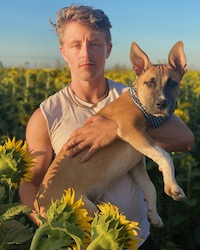
Eric Tymstra
(Ph.D. Candidate, Ecology)
The goal of this project was to support participants in achieving their goals and better managing their time. To achieve this goal, I ran a workshop highlighting time management tools for post-docs and graduate students and established working groups to support participants in achieving goals and managing time.
A virtual workshop was held and participants worked together to create a toolkit for time management strategies. Strategies ranged from using time-tracking techniques (e.g. Pomodoro timers) to setting boundaries with sources of distraction (e.g. coworkers, phones, social media, friends). The workshop was designed for participants to not only learn about new techniques/tools but also offer their own input. In addition to these practical tools, participants were introduced to the working groups offered by GRASP. All of the tools and ideas generated during the workshop were made available 24 hours after the end of the workshop too all participants. Additionally, all attendees were invited to participate in weekly working groups. Three working groups were established after the Winter workshop, and all continued to meet through the end of the quarter. The beginning of each meeting, participants (which included graduate and post-doctoral scholars from across disciplines), shared their goals for the week and the given working session. Participants then worked quietly in tandem with periodic breaks to share work updates. Participants reported back that the accountability of the groups helped them focus on a goal and remain motivated. Of the three groups, two will continue to meet through the summer.
Click here to view the final poster
Python Bootcamp for Incoming Graduate Students

Nathan Yoshino
(Ph.D. Candidate, Chemistry)
For many graduate students, coding will be an essential tool for the classroom or for research. However, many undergraduate curricula do not prepare students for these challenges. Incoming first-year students must struggle with programming before they can engage with course content. In response to this, an annual Python Bootcamp is held each year during orientation week before classes start in order to provide a programming foundation for new graduate students. Python was chosen as it is a free and versatile coding language whose fundamentals are translatable to other languages as well.
The workshop was held in person over three days. Each night, a one-hour lecture was given to demonstrate basic Python fundamentals and functionality. This was followed by a period where students were allowed to work on a cumulative assignment and were asked to implement the concepts demonstrated in each lecture. Students were encouraged to work in groups with support from volunteers. The primary objectives of the workshop were to enable students to perform basic programming, to equip them with the ability to find and teach themselves new functionalities and libraries in Python, and to demonstrate what real-world applications of programming look like.
To allow students to refer back to material and for students that were not able to attend, all recordings and resources were posted to a website: https://ucd-python-bootcamp.github.io/Bootcamp-2021/
